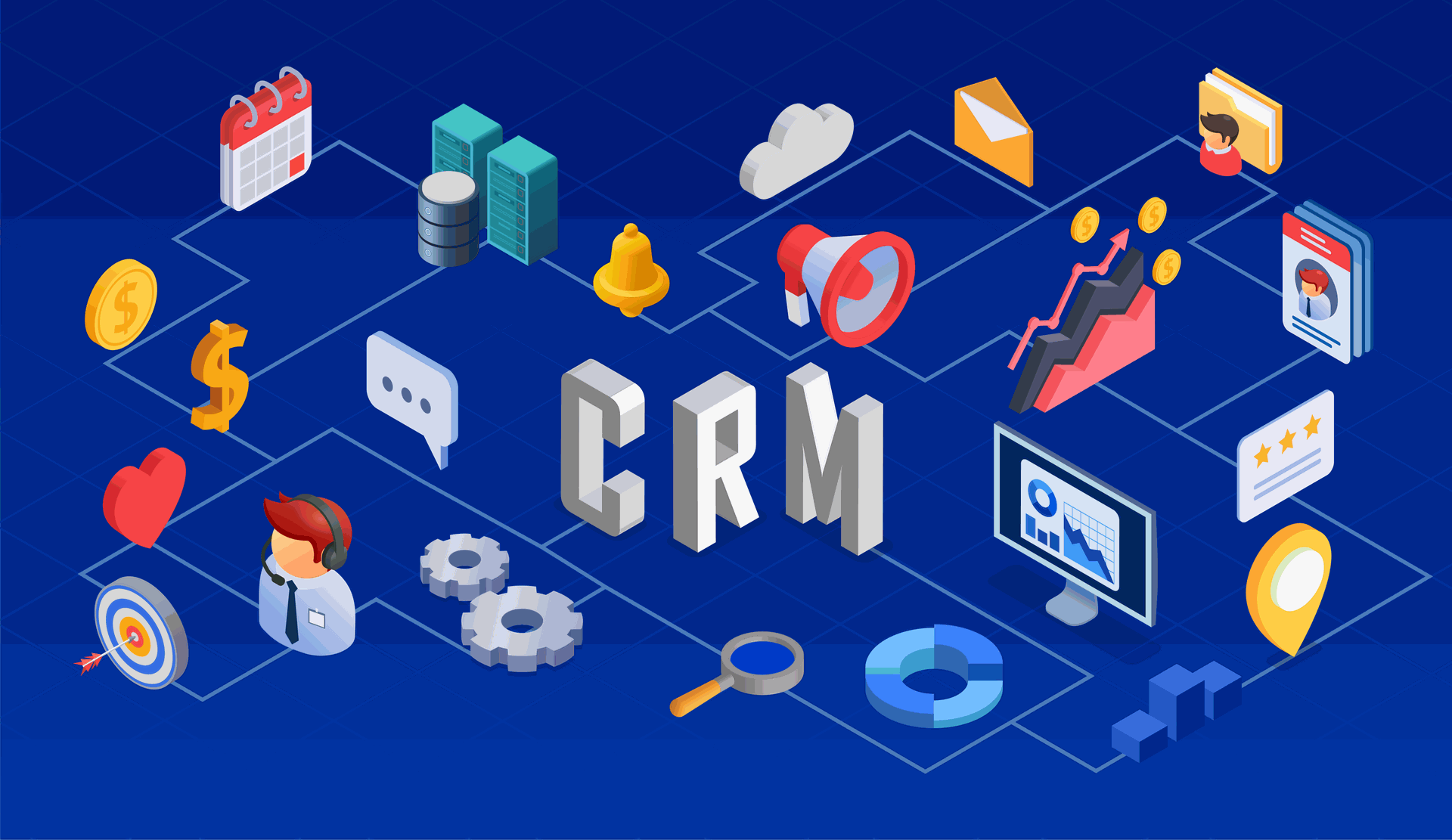In the digital era, AI is gradually becoming an "indispensable assistant" for businesses in customer care, behavior prediction, and sales performance optimization. Specifically, when integrated into a CRM (Customer Relationship Management) system, AI not only helps businesses manage data effectively but also delivers superior personalized customer experiences.
However, applying AI to CRM is not easy. Many businesses encounter barriers related to costs, data, human resources, and internal resistance to change. Without an appropriate strategy, an AI-CRM project can easily fall into the trap of "high investment but low efficiency."
So, what should businesses do to overcome these challenges and successfully deploy AI in CRM? Join us to find out in the article below.
1. Major challenges when deploying AI in CRM
While implementing AI in CRM offers many outstanding benefits, in reality, most businesses face a significant number of difficulties. The biggest obstacle is the initial investment cost for technology infrastructure, software, and system maintenance, which makes many small and medium-sized enterprises (SMEs) hesitant to begin deployment. Furthermore, customer data is often scattered, unstandardized, or lacks synchronization, leading to a situation where the AI cannot "learn" and analyze accurately to provide valuable suggestions.
Another challenge is internal human resources. Many businesses do not yet have IT, marketing, or sales teams that are knowledgeable enough about AI and CRM, which complicates the adoption process and requires additional training time. Moreover, integrating the AI system with the existing CRM is not simple: many companies are simultaneously using multiple platforms (ERP, email marketing, data management tools), making the connection of data between systems a complex problem.
Finally, the psychology of change-aversion within the business is also a considerable barrier. Some employees worry that AI might replace their jobs, leading to a lack of cooperation during the implementation process. All these factors make the application of AI in CRM a challenging journey, requiring businesses to have appropriate strategies and solutions to overcome them.
2. Roadmap for Preparing to Implement AI into CRM

To successfully implement AI in CRM, a business needs to prepare a clear roadmap, which can start with the following five basic steps:
Define clear strategy and objectives
The business needs to clarify: Where will AI assist in CRM? Will it be for data entry automation, customer data analysis, or sales forecasting? Having specific goals helps to avoid resource waste and makes performance measurement easier.
Standardize and optimize customer data
AI is only intelligent when trained with accurate data. Businesses must review, clean, and standardize data before integrating it into the CRM system, ensuring its completeness, consistency, and security.
Select the right AI-Integrated CRM solution
Not every CRM has the capability to integrate AI. Businesses should choose a solution that is flexible, easily scalable, and suitable for their current size, such as Salesforce, HubSpot, Zoho, or specialized platforms like Sota CRM from Sota Solutions.
Train Personnel and Change Mindsets
People remain the key factor. Training must be organized so that the sales, marketing, and customer service teams understand how AI supports their work, thereby increasing productivity instead of fearing replacement.
Start with a pilot then scale up
Instead of rolling out all at once, test AI on a small feature (e.g., an AI chatbot for customer service) to verify its effectiveness, then gradually expand to other departments.
3. Some applications of AI when integrated into CRM

There are many ways to integrate AI into an enterprise system, and CRM is one of the most common platforms for leveraging AI's power. While traditional CRM primarily stores and manages customer data, the addition of AI transforms the system into an intelligent tool capable of analysis, prediction, and automation. Below are some typical ways AI can be applied to CRM, helping businesses optimize operational processes and deliver superior customer experiences.
Sales and customer service process automation
AI can automatically perform data entry, lead qualification, send personalized emails, or prompt customer service agents at the right time. AI Chatbots quickly handle requests 24/7, reducing the load on the CS team. With the ability to operate across various channels such as Livechat websites, Facebook, Zalo, etc., the chatbot can automatically respond to all customer questions anytime, anywhere. The system is equipped with intent detection technology, allowing for personalized answers tailored to specific situations. In complex cases, the chatbot quickly transfers to a sales representative, ensuring customers always receive timely and accurate support.
Real-Time customer data analysis
AI leverages Big Data within the CRM to predict buying behavior, consumer trends, and customer satisfaction levels. Businesses can receive reports and suggested actions immediately instead of just looking at static data.
Personalizing the customer experience
Based on transaction history and interactions, AI provides relevant content and recommends suitable products/services for each customer. This helps boost conversion rates and long-term customer retention.
Supporting strategic decision making
AI in CRM can forecast sales, identify customers at risk of churn, or suggest optimal marketing campaigns. Leadership has a basis for making faster and more accurate decisions.
In other words, an AI-integrated CRM becomes a "virtual assistant" for the business – not only recording data but also analyzing, predicting, and optimizing the entire customer journey.
4. Long-Term benefits of overcoming challenges

When a business successfully implements AI in its CRM, the long-term benefits are evident in several aspects:
Workflow automation
AI minimizes manual operations like data entry, customer classification, and information updates. Employees can focus more on strategic activities such as personalized customer care or developing marketing campaigns.
Deep customer data analytics
AI in CRM can process vast amounts of data and provide predictive customer behavior insights. This supports the business in making fast and accurate decisions, such as selecting potential customer segments and forecasting seasonal purchasing needs.
Optimization of costs and human resources
When AI takes over repetitive tasks, personnel costs are significantly reduced. The business can reallocate resources to more critical tasks, simultaneously saving money and increasing efficiency.
Enhanced customer experience
AI-integrated CRM allows for the personalization of every customer interaction, from emails and chatbots to after-sales service. This seamless experience increases customer satisfaction and retention rates.
Creation of sustainable competitive advantage
Businesses that successfully adopt AI in CRM will quickly adapt to new trends, staying ahead of competitors in terms of service speed and quality. This is a crucial factor for maintaining a long-term competitive position in the market.
5. Sota Solutions – a provider and integrator of AI in CRM systems
To successfully deploy AI in CRM (Customer Relationship Management), businesses need more than just the right technology; they also need a partner with deep industry understanding, practical experience, and flexible integration capabilities. This is precisely the advantage of Sota Solutions, a technology company that provides specialized ERP/CRM/FMS solutions for the logistics sector and various other industries.
Following the AI development trend, Sota Solutions implements AI technology into its management and system operation solutions, such as: applying AI Chatbots for 24/7 customer care, automating data entry and data processing using AI-OCR (Optical Character Recognition), and ensuring the CRM system connects seamlessly with other platforms like ERP (Enterprise Resource Planning), FMS (Financial Management System), or various Marketing Automation tools.
A traditional CRM system typically focuses on storing customer data, managing the sales process, and following fixed customer care procedures. However, when integrated with AI, CRM transcends mere information management to become an intelligent platform capable of learning, analyzing, and providing strategic suggestions. For example, AI can automate sales and customer care processes, including automatic data entry, lead classification, sending personalized emails, or reminding staff to follow up with customers at the right time. Furthermore, an AI Chatbot can swiftly handle 24/7 requests, reducing the workload for the customer care team. These applications are already embedded in Sota Solutions’ AI-integrated customer management and care processes. Additionally, other smart integration needs are being researched and will be launched soon, based on customer requirements and market trends.
6. Conclusion
Implementing AI in CRM is not just a temporary technology trend but has become a strategic move that helps businesses enhance productivity, optimize costs, and deliver superior customer experiences. Although many challenges exist—such as cost, data, system integration, or human resources—with the right preparation, businesses can absolutely turn these barriers into opportunities for long-term growth.
More importantly, AI-integrated CRM will move beyond simple information management to become an “intelligent assistant” that supports analysis, forecasting, and the personalization of the customer journey. This provides a sustainable competitive advantage in the digital age. Contact us for the fastest consultation and to receive free materials!